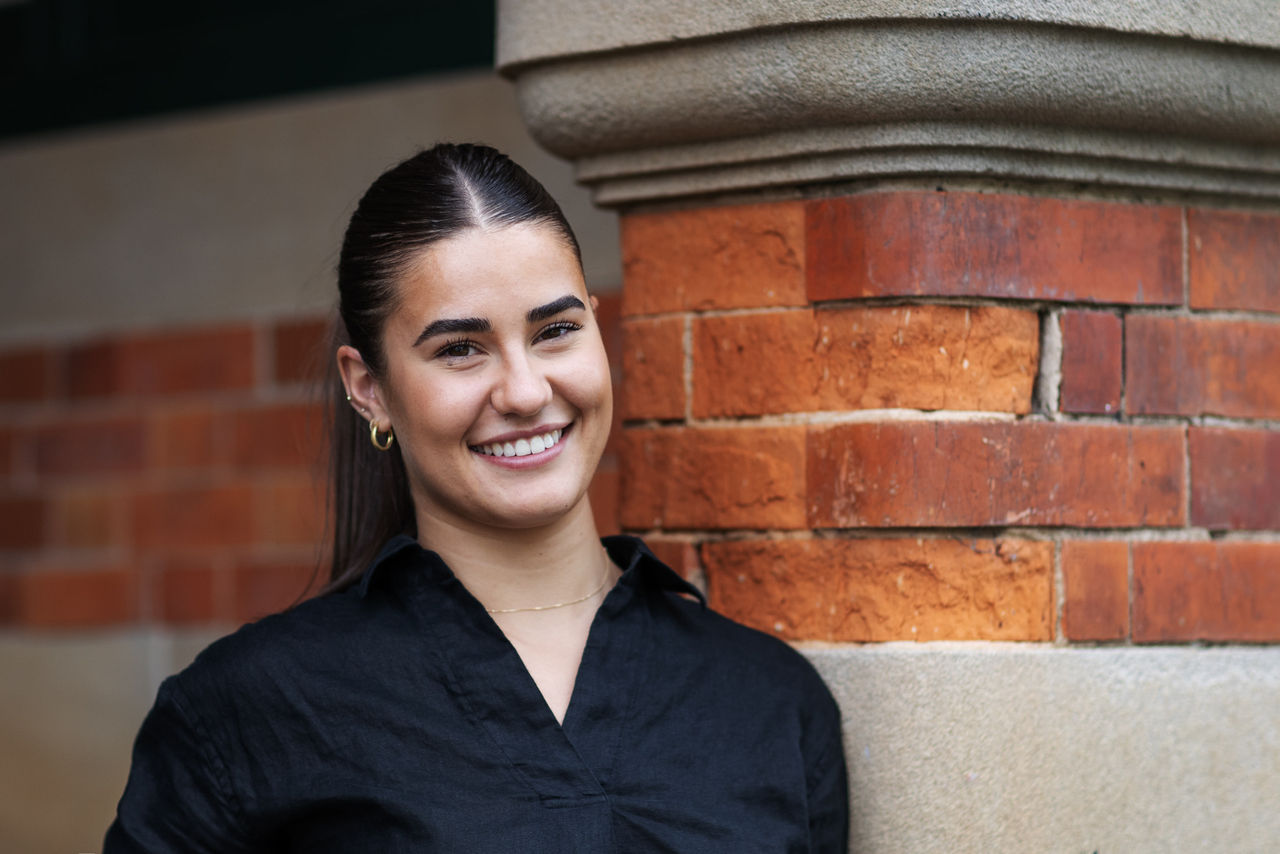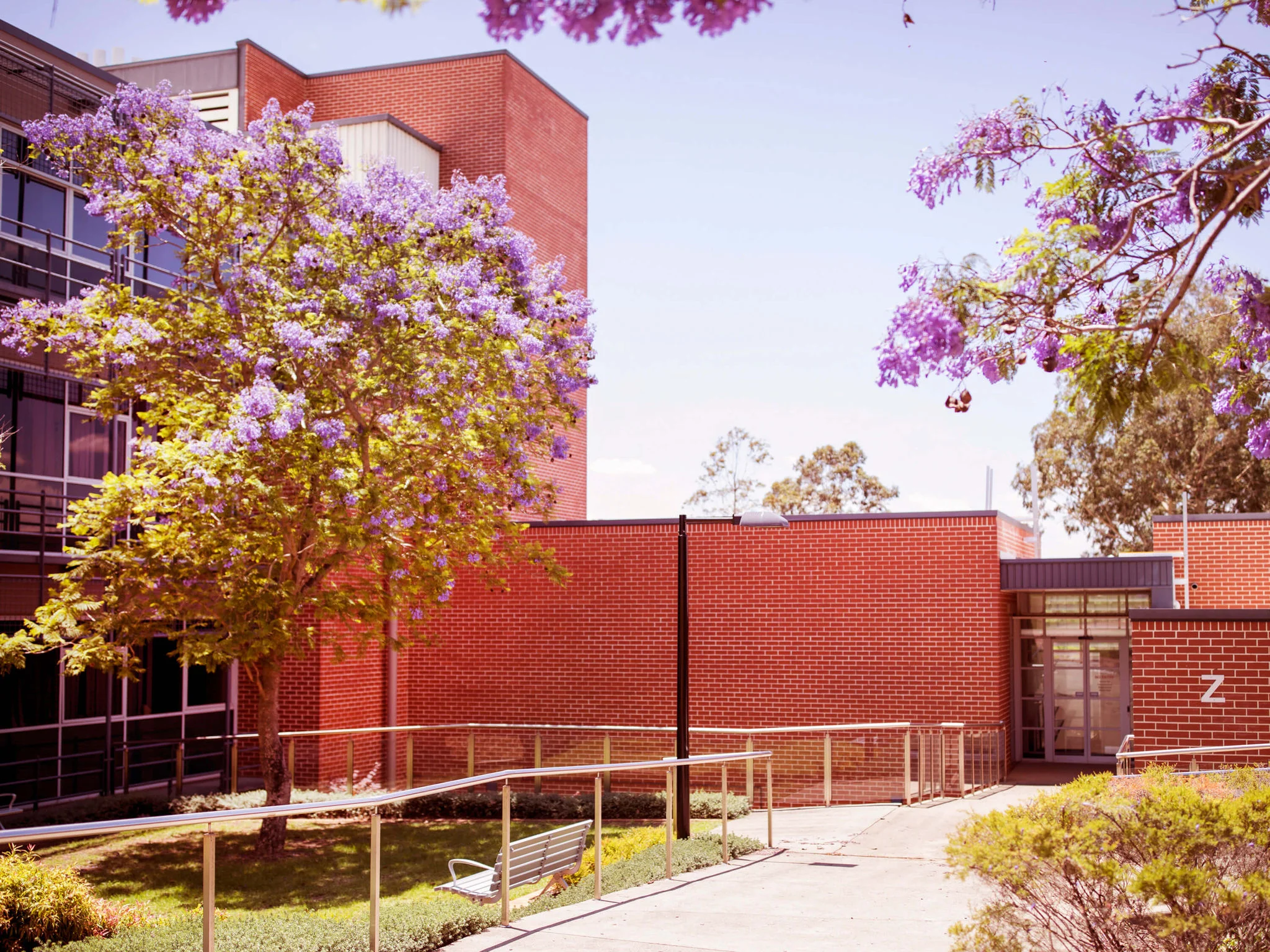In a fast-changing world, tomorrow belongs to people who are ready for anything. We’ll train you to be a critical thinker, not a narrow specialist. This degree will put you on the path to a Master of Teaching, and a rewarding career as an early childhood teacher. Alternatively, you can graduate with a combined early childhood and primary teaching qualification, enabling you to teach in both early childhood and primary settings. It will also give you the skills you need to explore your prospects beyond the classroom.
The Smart Path To Teaching
This degree will put you on the path to a Master of Teaching, and a rewarding career as an early childhood teacher. Alternatively, you can graduate with a combined early childhood and primary teaching qualification, enabling you to teach in both early childhood and primary settings. It will also give you the skills you need to explore your prospects beyond the classroom.
Graduates of this degree are eligible for direct entry into the Master of Teaching (Early Childhood and Primary) via the Transition to Teaching pathway. Completion of both the Bachelor and Master programs provides a teaching qualification for Early Childhood or Early Childhood and Primary teaching. Eligible students will receive advice during their final study session in the Bachelor of Arts (Pathway to Teaching Early Childhood/Primary) regarding how to accept an offer into the Postgraduate course to attain a teaching qualification.
The program incorporates Work Integrated Learning providing 20 days of professional experience in an early childhood setting. Students will immerse themselves in the setting and demonstrate the capacity to work effectively with children Birth – 5 years.
Students also complete an Engaged Learning Pool subject which gives them a choice of completing an internship, service learning, study tour (incl overseas), or to gaining 25 hours of engaged learning in a primary school by studying Teachers as Change Makers.
Free Access to Adobe Creative Cloud apps
As an Adobe Creative Campus, Western Sydney University gives all students complimentary access to the Adobe Creative Cloud, so you can level up your digital skills with FREE access to the Adobe Creative Cloud apps. It's like your very own innovation toolkit, where technology meets creativity!
Adobe Creative Cloud is a comprehensive suite of software tools and services which provide a one-stop platform for professionals and enthusiasts in various creative fields, offering a wide range of applications for graphic design, video editing, web development, photography, and more!
What you can expect to study
The program structure is outlined in our handbook. Here you can view all of the subjects you will be studying.
Language specialisations aim to enable students to develop an appropriate level of proficiency in a second language, which may be used for professional purposes such as teaching, interpreting and translation, business or international relations.
Students undertaking a language specialisation will be able to use the language in question according to its grammatical and pragmatic principles, communicate with native speakers appropriately in the spoken as well as the written mode, and demonstrate an understanding of the cultures and societies associated with the language.
Childhood Studies is a multidisciplinary and interdisciplinary field that explores the meanings of childhood as a social category and researches children’s lives and experiences. The child, children’s rights and wellbeing are identified by UNICEF as central to the implementation of the UN Sustainable Development Goals.
This major allows students to analyse the intersection of childhood with other significant categories of social difference and to contribute to community and policy responses that impact children’s lives, rights and wellbeing. The major is valuable for students who seek a career in teaching or other career that involves working with, thinking critically about or researching children.
Language majors aim to enable students to develop an appropriate level of proficiency in a second language which may be used for professional purposes such as teaching, interpreting and translation, business or international relations.
Students undertaking a language major will be able to use the language in question according to its grammatical and pragmatic principles, communicate with native speakers appropriately in the spoken as well as the written mode, and demonstrate an understanding of the cultures and societies associated with the language.
The Creative Writing major provides students the opportunity to produce their own creative writing and to edit and publish their work. Students study with professional authors, editors and publishers from the Writing and Society Research Centre and staff from the School of Humanities and Communication Arts.
In addition, students have the opportunity to study contemporary approaches to language and literary studies, including literary criticism and theory, linguistic analysis, genre and textual study, and to read and examine a wide selection of modern and classic literatures. Career prospects include publishing, editing, teaching, writing and advertising.
Culture and Society is an interdisciplinary major developing knowledge, research skills and analytic capacities relevant to understanding and interpreting landscapes of cultural diversity and social difference in our contemporary world, both in terms of the broad contours, as well as specific micro-social environments.
This major provides grounding in contemporary debates and methodologies in cultural studies and social theory, and draws on various disciplines including history, sociology, communications, and linguistics.
Topics include popular culture, everyday urban life, cultural and social impacts of scientific theories and new technologies, multiculturalism, and contemporary spirituality.
Study in this area is relevant for work involving commentary and analysis of contemporary social issues and cultural practices (e.g. journalism, teaching, activism) and fields concerned with designing, delivering and evaluating cultural and artistic productions, and education, communication, welfare or health services, in culturally diverse communities.
The English major invites students to explore contemporary approaches to language, literary studies and writing, including literary criticism and theory, linguistic analysis, genre and textual study, and creative writing. The English major focuses on the imaginative workings of language, and students can study a wide selection of modern and classic literature, as well as the relationships between written texts and other media such as film and information technology.
Students also have the opportunity to produce their own creative writing and to edit and learn how to publish their work. Career prospects include publishing, editing, teaching, writing and advertising.
Since the revival of humanist thought in the Renaissance, universities have placed studies in history and political thought at the centre of exploring what it is to be human.
At the heart of the History and Political Thought major are four compulsory units which introduce the student to the modern (since 1500) history of humanity.
Although Europe is very prominent in the Major, the student will be invited to compare its history to the histories of Asia, Africa and the Americas. The Major culminates in a capstone unit in students’ final semester discussing historical theories and methods.
A wide range of elective units covers European, American, Australian and Asian history and political thought and includes thematic units which range widely over time and place.
What does it mean to live in Indigenous Australia? The Indigenous Australian Studies major offers you the exciting opportunity to acquire key cultural competencies that will enable you to understand and work more effectively with Indigenous Australians in professions such as the arts, communications, media, education, government and non-government, policy, health, sciences, and community services.
The Indigenous Australian Studies major addresses the cultural, historical, social and economic issues affecting Indigenous and non-Indigenous Australians, and relationships.
Language specialisations aim to enable students to develop an appropriate level of proficiency in a second language, which may be used for professional purposes such as teaching, interpreting and translation, business or international relations.
Students undertaking a language specialisation will be able to use the language in question according to its grammatical and pragmatic principles, communicate with native speakers appropriately in the spoken as well as the written mode, and demonstrate an understanding of the cultures and societies associated with the language.
International English examines English in its many varieties with a focus on the international development of this language, extending far beyond native English speakers, and identifying features of the language essential to academic and professional performance.
The major provides a basis for international students who may intend to teach English in different countries, or enter other language-centred professions, or for local students intending to pursue post-graduate qualifications in education or wanting to improve English skills.
The major provides studies in the varieties and structures of English, informed by specific studies in linguistics, English teaching and bilingualism and language acquisition.
This major has been designed to meet the needs of Australian government, business and society to engage the states and peoples of Asia at all levels in pursuit of national interests and as part of the globalisation process.
It provides students with the opportunity to study contemporary Asia, as well as the rich and diverse histories, politics, cultures and languages of Asian countries and the international issues affecting Australia’s interests and role in the region and in the world at large.
The major area also includes a range of units concerned with the United States and Europe as well as with Asia itself, and units in international relations covering other parts of the world. It seeks to produce graduates with a broad, liberal education with the skills to mediate between Australia and the world in general and Asia in particular through political, economic, commercial, cultural, diplomatic and strategic links.
Students are encouraged to undertake a sub-major in an Asian language in conjunction with the major. Employment opportunities may be found in the State and Commonwealth public service, overseas organisations, the media, business and industry, education and research.
Students engage in interdisciplinary study essential to an understanding of Islam, past and present. The area of study balances historical and modern Islamic studies and research methods.
One of the keys to Islamic Studies is ‘relevance’ to contemporary Australian society but relevance can only come from a sound comprehension of past traditions in Islamic scholarship and their socio-historical contexts.
Preparation for graduate study is also a key objective of this program, with its focus on developing critical and interdisciplinary research skills through a combination of approaches. Students are encouraged to undertake a sub-major in Arabic to complement the Islamic Studies major.
Language majors aim to enable students to develop an appropriate level of proficiency in a second language which may be used for professional purposes such as teaching, interpreting and translation, business or international relations.
Students undertaking a language major will be able to use the language in question according to its grammatical and pragmatic principles, communicate with native speakers appropriately in the spoken as well as the written mode, and demonstrate an understanding of the cultures and societies associated with the language.
Language is fundamental to the human experience. Through study of how language works, students make contact with fundamental philosophical, socio-cultural, and psychological questions about what it means to be human.
Linguistics prepares students with a foundation for many careers including primary and secondary teaching, policy analysis, communication, and social services in culturally diverse communities.
Linguistics students also gain the analytical tools of empirical science including the ability to break complex problems into components with tractable solutions and to evaluate theories on the basis of empirical facts.
These skills prepare students for success in post-graduate studies and careers in research, analytics, business and law.
The Music Performance major provides students with the opportunity to develop their professional and creative potential in making and appreciating a range of different kinds of music.
Students will gain practical experience in performance as a soloist and in groups, and through improvising and collaborating.
The Musicology major provides students from outside the Music program with an introduction to the history of Western classical music, and popular and classical musics in the twentieth and twenty-first centuries.
It offers perspectives on modernism, postmodernism and post-postmodernism, and incorporates social, political and philosophical critiques of music.
Philosophy has always asked the “big questions” about our lives. These are questions, for example, about the limits of our knowledge, the best way that humans can live together, how we understand the world around us, and what is the good life.
A philosophy major will enable students to develop particular skills and attributes - such as clear thinking, capacities to assess arguments and values, sound understanding of important philosophical views that have always been essential to university scholarship, and which continue to be valuable for graduates in both public and private life.
The Psychological Studies major comprises units in the discipline of psychology that focus on the field of inquiry that uses scientific techniques and methods to understand and explain behaviour and experience.
Areas of study include: the brain and behaviour, learning, motivation and emotion, social psychology, lifespan development, perception, and cognitive processes. A Psychological Studies major does not meet APAC requirements for an accredited sequence in Psychology.
Students wishing to enrol in an accredited Psychology sequence should complete the Psychology key program of 160 credit points.
Career Opportunities
As a graduate of this degree, you can look forward to a broad range of exciting career opportunities in different sectors and industries. Below are some examples of the possible careers you can pursue with this degree:
- Government roles
- Non-government organisation roles (policy development, administrative support, and advocacy)
- Higher education or private education roles (tutoring, student support, working in professional services)
- Media and communications organisations
- Advertising
- Arts and cultural organisations (gallery assistants, public programs)
Entry requirements for domestic students
Applicants who have undertaken studies overseas may have to provide proof of proficiency in English. Local applicants who are applying through the Universities Admissions Centre (UAC) will find details of minimum English proficiency requirements and acceptable proof on the UAC website. Local applicants applying directly to the University should also use the information provided on the UAC website. Find out more here.
Admission
- Assumed knowledge: 2 units of HSC Mathematics and 2 units of HSC English or equivalent.
- Recommended studies for school leavers: Band 4 or above in both HSC English and HSC Mathematics or equivalent;
- Applicants are selected by one of the below listed criteria:
- On the basis of their ATAR score or equivalent rank, or
- Completion of a Diploma of Early Childhood Education and Care or relevant equivalent VET award, or
- Certificate III in Early Childhood Education and Care (or relevant equivalent VET award) and two years’ full time equivalent work experience.
Credit for Prior Learning
Information on pathway credit and credit for prior learning is available here.
Special Requirements
TEAC 2023 Engaging in Early Childhood Education requires completion of Working with Children Check, Child Protection Awareness Training and ASCIA e-Anaphylaxis online training for education and care prior to enrolment in the subject.
Please consult the handbook for more information.
Entry requirements for international students
**The Part-time option is not available to International Students on a Student Visa.
Applicants who have undertaken studies overseas may have to provide proof of proficiency in English. Local applicants who are applying through the Universities Admissions Centre (UAC) will find details of minimum English proficiency requirements and acceptable proof on the UAC website. Local applicants applying directly to the University should also use the information provided on the UAC website.
International students currently completing an Australian Year 12 in or outside Australia, an International Baccalaureate in Australia or a New Zealand National Certificate of Educational Achievement (NCEA) level 3 must apply via UAC International.
All other International applicants must apply directly to the University via the International Office.
International students applying to the University through the International Office can find details of minimum English proficiency requirements and acceptable proof on their website.
Overseas qualifications must be deemed by the Australian Education International - National Office of Overseas Skills Recognition (AEI-NOOSR) to be equivalent to Australian qualifications in order to be considered by UAC and Western Sydney University.
Admission
- Assumed knowledge: 2 units of HSC Mathematics and 2 units of HSC English or equivalent.
- Recommended studies for school leavers: Band 4 or above in both HSC English and HSC Mathematics or equivalent;
- Applicants are selected by one of the below listed criteria:
- On the basis of their ATAR score or equivalent rank, or
- Completion of a Diploma of Early Childhood Education and Care or relevant equivalent VET award, or
- Certificate III in Early Childhood Education and Care (or relevant equivalent VET award) and two years’ full time equivalent work experience.
Credit for Prior Learning
Information on pathway credit and credit for prior learning is available here.
Special Requirements
TEAC 2023 Engaging in Early Childhood Education requires completion of Working with Children Check, Child Protection Awareness Training and ASCIA e-Anaphylaxis online training for education and care prior to enrolment in the subject.
Please consult the handbook for more information.
Indicative annual fee
A Commonwealth Supported Place (CSP) is one that is subsidised by the Commonwealth and applicable only to Domestic students. This means that the Australian Government pays part of your fees towards your program, therefore reducing your program fees, and the remaining amount is paid by you, this is considered your Student Contribution.
The fee estimates provided are indicative only and subject to change. These estimates are based on the current fee structures for a normal full time study load. However, the final fees may vary depending on several factors, including the specific subjects chosen, the duration and timing of study, and annual fee adjustments (subject to Commonwealth student contribution band rates). Please note that these estimates do not include the Student Services and Amenities Fee. We encourage all prospective and current students to consult with our Student Services Hub for the most current fee information.
As a multi-campus institution, Western Sydney University and its entities reserves the right to alter the location of its programs between campuses and other locations as necessary.
To work out how much your Student Contribution will be before you study, you will first need to find out the Student Contribution band your subjects fit into based on their general discipline area.
You can then calculate your student contributions to work out the total amount of your contribution.
The Higher Education Loan Program (HELP) is a range of loans introduced by the Australian Government from 2005 to provide fee payment assistance to eligible students. Loans are for Australian citizens studying in Australia or overseas. Permanent residents who hold a humanitarian visa are also eligible if studying in Australia.
If eligible you may be able to defer all or part of your Student Contribution through the HECS-HELP loan program. You may also be eligible for OS-HELP if undertaking studies overseas.
New Zealand citizens and holders of an Australian permanent resident visa (other than an Australian permanent humanitarian visa) are generally not entitled to HECS-HELP assistance. If you are a New Zealand citizen or permanent resident your Student Contribution amount must be paid in full by the census date.
However, the Australian Government has passed new legislation that changes the way some New Zealand citizens, who hold a Special Category Visa (SCV), studying in Australia will pay their fees. More information is available on the Changes to fees for New Zealand Citizens webpage.
Apply as a Domestic Student
If you are a domestic student, you can apply through our Western Application system which is free of charge.
Domestic students are:
- Australian Citizens
- New Zealand Citizens
- Australian permanent residents
- Australian permanent humanitarian visa holders
Scholarships
Western Sydney University recognises and rewards students who demonstrate community engagement, outstanding academic ability and superior leadership skills. Donor-funded scholarships are also available, providing support for students based on both academic achievements and equity considerations. There are also scholarships available for specific degrees.
The fee estimates provided are indicative only and subject to change. These estimates are based on the current fee structures for a normal full time study load. However, the final fees may vary depending on several factors, including the specific subjects chosen, the duration and timing of study, and annual fee adjustments (subject to Commonwealth student contribution band rates). Please note that these estimates do not include the Student Services and Amenities Fee. We encourage all prospective and current students to consult with our Student Services Hub for the most current fee information.
As a multi-campus institution, Western Sydney University and its entities reserves the right to alter the location of its programs between campuses and other locations as necessary.
Apply as an International Student
If you are an international student, you can apply for free through our international student application system or through an agent representative.
International students are:
- Not an Australian citizen;
- Not a New Zealand citizen; and
- Not a permanent resident of Australia.
If you are an international student completing the Australian HSC, IB or NCEA, apply direct via UAC International.
Admission to Western Sydney University is on the basis of meeting minimum academic and English language requirements. For more information about tuition fees and other costs, visit the Fees and Costs page.
Scholarships
When you apply to Western, you’re automatically assessed for a Scholarship, no additional application required! We’re offering multi-year scholarships (for up to 3 years) valued at $6,000 or $3,000 and even 50% off tuition fees. Scholarships are awarded on academic merit.
Want to know more?
We're here to provide clarity.
If you're uncertain about your study journey, enquire about our program today and gain the confidence to move forward.
Australian students
1300 668 370
International students
+61 2 9852 5499

The fee estimates provided are indicative only and subject to change. These estimates are based on the current fee structures for a normal full time study load. However, the final fees may vary depending on several factors, including the specific subjects chosen, the duration and timing of study, and annual fee adjustments (subject to Commonwealth student contribution band rates). Please note that these estimates do not include the Student Services and Amenities Fee. We encourage all prospective and current students to consult with our Student Services Hub for the most current fee information.
As a multi-campus institution, Western Sydney University and its entities reserves the right to alter the location of its programs between campuses and other locations as necessary.





